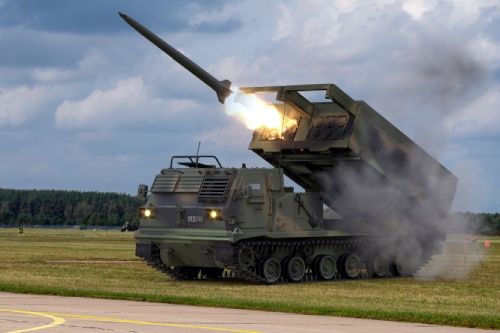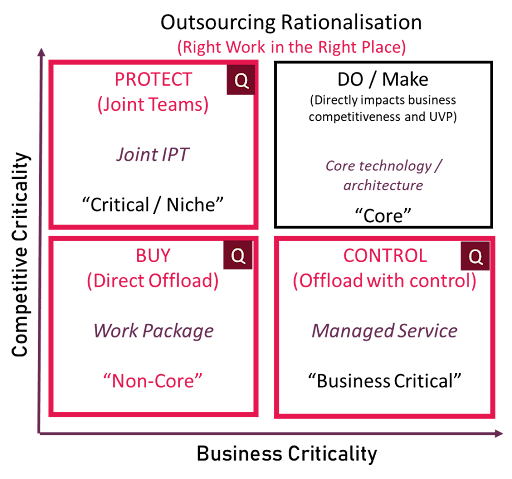
The United Kingdom’s defence industry is a cornerstone of national security and technological innovation. In recent years, defence spending across land, air, and sea domains has increased, placing extraordinary pressure on industry to accelerate programme delivery while adhering to stringent security and sovereignty requirements. These challenging environments necessitate fresh thinking about the wise utilisation of engineering service delivery and partnering models that can aid in meeting these complex demands.
The defence industry operates fundamentally differently from commercial aerospace. Defence programmes typically span decades, involve multiple government stakeholders and industrial partners, and operate within complex procurement frameworks. While commercial aerospace has embraced strategic engineering partnerships with outsourcing levels approaching 30%, the defence sector maintains remarkably lower levels, typically under 5% for true strategic partnerships in engineering outsourcing. This disparity stems from the unique nature of defence programmes. Unlike their commercial counterparts, UK defence contractors receive funding throughout product development and must wait until product delivery for revenue realisation. This payment structure provides programme stability but often reduces incentives for operational efficiency improvements. Additionally, the UK’s defence procurement landscape prioritises transparency through increasingly complex processes, sometimes sacrificing agility for compliance.
Limitations of traditional engineering service models

Current engineering service approaches in UK defence manifest primarily in two forms, neither adequately serving modern defence programmes’ evolving needs.
The first approach involves direct contingent labour engagement through numerous agencies, essentially “body shopping” with minimal strategic value. This model provides temporary capacity but fails to deliver a strategic advantage or drive innovation across programmes. It creates administrative overhead and limits knowledge retention within core programmes.
The second approach attempts to identify and package complete work segments for specialist providers, similar to how prime contractors engage with major subsystem suppliers. However, this model often proves impractical given the integrated nature of defence systems, changing requirements, and the need to maintain sovereign capabilities. The complexity of defence systems also makes clean work package separation difficult, creating integration challenges and potential responsibility gaps.
Further complicating matters, security requirements mandate that work remains within UK borders, eliminating traditional cost arbitrage opportunities available in commercial sectors. These restrictions create a unique landscape for engineering services that demand tailored partnership models rather than off-the-shelf solutions.
The need for strategic partnership approaches
Recent developments in UK defence programmes illustrate the growing necessity for innovative engineering partnership models. Major current initiatives like the Future Combat Air System (FCAS) and SSN-A submarine programmes pose immensely challenging technology and delivery schedules that require advanced levels of engineering capability on an unprecedented scale. These programmes’ delivery timeline and operating landscape demand innovation and a completely different approach to design, development, and Through Life Support than their predecessors. This, in turn, requires new engineering methods and processes and a fresh approach to accessing and deploying engineering talent while maintaining programme control and protecting intellectual property.
The traditional approach of engaging engineering suppliers through contingent labour or full work package outsourcing proves insufficient for these complex programmes. Leading organisations now recognise the need for Strategic Engineering Partners who are capable and willing to proactively invest and share operational risks.
Quest Global’s sole purpose in engaging with the UK Defence sector is to create value for its customers through a strategic Partnership Approach that will enable efficient programme delivery with reduced operational risks. This is achieved through an Extended Engineering Team model that operates as a trusted layer around the core customer engineering team, working seamlessly across several delivery models.
Quest Global’s partnership model for UK Defence
Quest Global has developed a partnership model tailored to the UK defence sector. Our approach recognises both the constraints and opportunities unique to defence programmes. Rather than attempting to force commercial aerospace models into defence applications, our approach builds from the ground up to address defence-specific requirements. The model enables various engagement types depending on programme needs and security requirements:
To develop the partnership model, we invest significant time with customers upfront to understand their engineering landscape and help build a joint roadmap to deliver strategic objectives. The fundamental approach is based on developing the Engineering Partnering strategy through assessing work in four Categories (refer to the figure below):
- Do: Business Critical and Competitive Critical (In-House) – Core technological capabilities that directly impact competitive advantage must remain internal
- Buy: Non-Critical (Full offload through work packages) – Commodity or non-core services that can be fully outsourced as a package
- Protect: Competitive Critical, but not Business Critical (Joint Teams) – Adjacent activities involving skills that must be retained internally and require close collaboration, delivered through joint team delivery models
- Control: Business Critical, but not Competitive Critical (Managed Offload) – Process-driven activities that remain business-critical but benefit from standardisation and can be managed through controlled partnerships

Whilst traditional engineering outsourcing models are governed by a Do/Buy matrix (internal vs. offload), they often ignore the types of work that fall under the Protect and Control category and a mechanism to deliver this work in a strategic partnering approach. In a Defence environment, Strategic Partnering comprises work that falls under the Buy, Protect, and Control categories, with the latter two often contributing to over 80% of the work scope.
The delivery of the work in a partnering model is often managed through the models below:
Joint integrated project teams (Typically for work in the Protect category)
This engagement model brings together customer and partner teams for critical developments, ensuring knowledge transfer while maintaining programme control. This approach works particularly well for complex / cross-functional system development where requirements evolve over time and a close collaboration along with a risk-sharing mindset is required. These are not fully scoped-out packages of work but rather a series of tasks/sprints undertaken throughout the project to deliver the overall programme.
Work package delivery (Typically for work in the Buy category)
This model provides frameworks for handling well-defined work scopes while ensuring integration with core programmes. It establishes clear deliverables and interfaces, maintaining programme integrity while optimising resource utilisation.
Managed services (Typically for work in the Control category)
This approach enables efficient delivery of process-driven activities that benefit from standardisation and scale. It applies particularly well to ongoing activities that require consistent quality, with the partner company having process ownership through delegated customer approval and the overall process being controlled by the end customer.
Each engagement model includes appropriate governance frameworks, security protocols, and performance metrics tailored to defence requirements. This flexibility allows defence organisations to apply the right partnership model to each programme element rather than forcing a one-size-fits-all approach.
Quest Global’s strategic role in UK Defence

Quest Global brings decades of engineering expertise to the UK defence sector, serving as a strategic partner to significant defence organisations across air, land, and sea domains. Our dedicated UK defence practice has established a strong track record of delivering complex engineering programmes while maintaining the highest standards of security and sovereignty. We maintain specialised teams with appropriate security clearances and domain expertise across critical areas, including:
- Product development and testing
- Embedded Systems and Software development
- Systems engineering and integration
- Digital thread creation across the product lifecycle
- Advanced manufacturing support and supply chain optimisation
- Platform modernisation and technology insertion
- Through-life support and sustainability engineering
- Critical infrastructure management and facilities engineering
- PLM implementation and configuration
- Product Non-Conformance and Modification Management
These capabilities have proven valuable in programmes requiring rapid modernisation and technology integration. Our engineering services encompass the full spectrum of defence programme needs, from early-stage design and development to Through Life Support.
Quest Global has established Centres of Competencies (CoC) focused on specific defence engineering disciplines, enabling knowledge sharing and best practice development while maintaining strict security protocols. This approach has enabled us to help UK defence organisations reduce programme delivery timelines while optimising engineering resources. Our commitment to the UK defence sector is demonstrated through continuous investment in local capabilities and talent development. Quest Global also maintains strong relationships with UK technical institutions and actively participates in developing the next generation of defence engineering talent.
Advantages of strategic engineering partnerships
Organisations that successfully implement strategic partnership models position themselves to handle increasing programme complexity while maintaining focus on core technological capabilities. Measurable benefits include:
- Strategic capability and capacity at scale
Strategic partnerships enable defence organisations to maintain appropriate staffing levels across programme lifecycles, avoiding the peaks and troughs that challenge purely internal delivery models. This approach reduces recruitment and training costs while maintaining programme continuity.
- Accelerated programme delivery
Capabilities at scale, operating as an extended team, and sharing operational risks drive accelerated programme delivery. When implemented effectively, this acceleration has proven to reduce programme timelines by 15-20%, particularly in the development phases.
- Enhanced focus on core capabilities
As partners handle adjacent and support activities, internal teams can focus on core technological development that maintains competitive advantage and sovereignty. This focus increases innovation potential in critical programme areas.
- Proactive investments and operational risk sharing
The partnership approach ensures operational risk sharing, with the partnering company proactively investing in strategic infrastructure and capability development, while sharing the operational risks in project delivery.
- Knowledge transfer
Well-structured partnerships facilitate knowledge exchange between defence organisations and their partners, bringing fresh perspectives and innovative approaches to traditional defence challenges.
These benefits materialise when partnerships are structured with clear objectives, appropriate governance, and mutual commitment to programme success. To overcome traditional barriers, the transformation requires cultural alignment and executive sponsorship from both sides.
The future of UK Defence engineering partnerships
The future of defence engineering services in the UK lies not in binary choices between internal delivery and outsourcing, but in nuanced partnership models that create value while maintaining programme integrity. These partnerships must carefully balance competing priorities: maintaining security and sovereignty requirements, optimising resource utilisation, and driving innovation through cross-industry knowledge transfer.
As defence programmes grow increasingly complex and technology-intensive, strategic engineering partnerships will become essential to programme success. Organisations that develop effective partnership models now will position themselves advantageously for future defence programmes that demand unprecedented engineering scale and capability.
Quest Global stands ready to support this transformation, bringing both defence-specific expertise and cross-industry experience to create value for UK defence programmes. Our commitment to the UK defence sector remains unwavering as we continue developing partnership models that meet the evolving needs of defence organisations and their critical national security missions.

